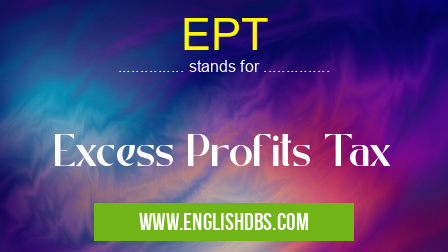What does EPT mean in TAX
EPT stands for Excess Profits Tax, a tax imposed on unusually high profits made by businesses during exceptional circumstances, such as wars or economic booms. It is designed to capture the windfall profits that companies earn when demand for their products or services skyrockets, leading to higher prices and increased revenues.

EPT meaning in Tax in Business
EPT mostly used in an acronym Tax in Category Business that means Excess Profits Tax
Shorthand: EPT,
Full Form: Excess Profits Tax
For more information of "Excess Profits Tax", see the section below.
What is EPT?
EPT is a temporary tax that is typically implemented during periods of high inflation or economic growth. It is intended to prevent companies from amassing excessive profits while the economy is booming. The tax is calculated on the difference between a company's current profits and a predetermined "normal" profit level.
How is EPT Calculated?
The calculation of EPT can vary depending on the specific legislation in place. However, in general, it is calculated as follows:
- Determine the company's "standard profit," which is usually based on historical earnings or industry benchmarks.
- Calculate the company's "excess profits" by subtracting the standard profit from the current profits.
- Apply the EPT rate to the excess profits to determine the tax liability.
Purpose of EPT
EPT serves several purposes:
- Revenue Generation: It generates additional revenue for the government during exceptional economic conditions.
- Equity: It ensures that companies do not profit excessively from situations that are not a result of their own actions.
- Inflation Control: It helps to reduce inflationary pressures by limiting the amount of money in circulation.
Essential Questions and Answers on Excess Profits Tax in "BUSINESS»TAX"
What is Excess Profits Tax (EPT)?
EPT is a tax imposed on businesses that earn excessive profits during periods of economic prosperity or wartime. It is designed to capture windfall profits that are not considered to be part of normal business operations.
How is EPT calculated?
EPT is typically calculated by comparing a business's current profits to its historical profits or to industry benchmarks. The excess profits, which are subject to taxation, are the amount that exceeds the predetermined acceptable level.
What is the purpose of EPT?
EPT has several purposes:
- To raise revenue for governments during times of fiscal need.
- To reduce inflationary pressures by skimming off excess profits.
- To discourage businesses from engaging in profiteering or excessive risk-taking.
- To promote economic fairness by ensuring that companies share the burden of extraordinary profits.
When is EPT typically implemented?
EPT is often implemented during wartime or other periods of national emergency when businesses may experience windfall profits. It can also be used in times of economic boom to prevent excessive corporate profits.
Are there any exemptions or deductions for EPT?
Exemptions and deductions for EPT vary depending on the specific legislation and jurisdiction. However, common exemptions include:
- Profits reinvested in the business for expansion or capital improvements.
- Profits earned by certain essential industries or small businesses.
- Profits that are used to fund research and development.
Final Words: EPT is a tax that is imposed on businesses during periods of exceptional economic activity. It is designed to capture windfall profits and prevent excessive profiteering. The calculation of EPT varies depending on the legislation in place, but generally involves comparing current profits to a predetermined standard profit level. EPT serves various purposes, including revenue generation, equity, and inflation control. It is a temporary measure that is typically implemented during times of high inflation or economic growth.
EPT also stands for: |
|
| All stands for EPT |
